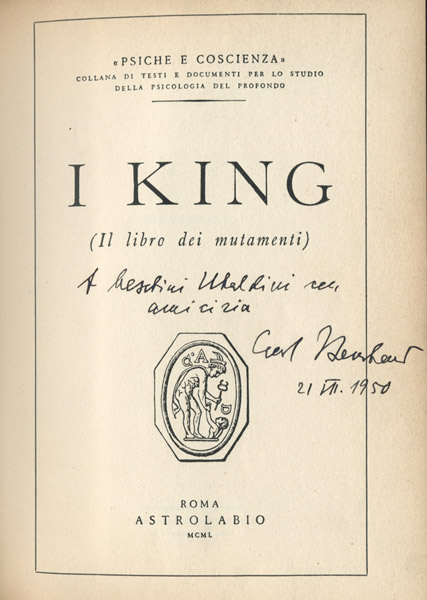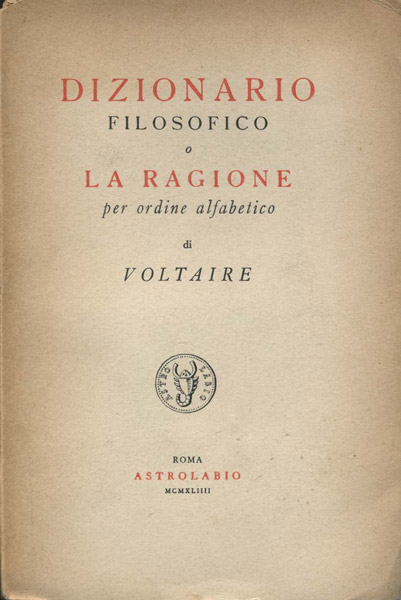The publishing house
The history of the publisher Astrolabio is closely linked with the figure of Mario Ubaldini, its founder and, until his death in 1984, its director. After running an important literary magazine,
La ruota [The wheel] between 1937 and 1943, Ubaldini started the publishing house in 1944 with the publication of his own translation of Voltaire’s
Philosophical Dictionary. He immediately set up various
initial series, but soon the publisher took on a stronger, more focused identity, which would provide the foundations for its activity until the present day. Fundamental to shaping
this identity were some of Ubaldini’s encounters with figures from the intellectual and professional worlds,
notably Edoardo Weiss, Ernst Bernhard and Giuseppe Tucci.
Between 1947 and 1950 Ubaldini set up various new series, beginning with the one edited by Ernst Bernhard and still active today, under the name Psiche e coscienza [Psyche and consciousness]. Besides fundamental works by Freud and Jung, this series published classic texts of Eastern civilization, such as the well-known I Ching (now more properly transcribed Yi jing), works by great orientalists such as Giuseppe Tucci, a celebrated 17th-century text by the Jesuit priest de Caussade, and the mythological studies of Karol Kerényi. These characteristics would define the twofold areas of interest that would typify Astrolabio: clinical psychology and the religions and philosophies of the Far East.
The other series were dedicated to evolutionary psychology (edited by Ferdinando Cislaghi), the mind-body relationship (edited by Giulio Maffezzoni), parapsychology (edited by Emilio Servadio), popular science (edited by A. C. Blanc and G. Gallarati), and social psychology. Some volumes were issued outside the series, such as the well-known Autobiography of a Yogi by Yogananda (1949), and a new initiative was announced: a historical, literary, philosophical-religious and artistic encyclopaedia under the editorship of Giuseppe Tucci, entitled Civiltà dell’Oriente [Civilisations of the East]. This encyclopaedia was not in the end published, but in 1960 its title was given to the publisher’s second key series, still active today, which brought together texts dealing with the philosophies and religions of the Far East.
Between 1954 and 1959, editorial work came to a standstill owing to various problems. These were resolved at the beginning of 1960, and work began again with the launch of two journals, and with a reorganization of the series, which restarted without an editor. Psiche e coscienza started up again; Civiltà dell’Oriente came out, followed immediately by Ulisse [Ulysses], Collana di filosofia e epistemologia [Philosophy and epistemology series], and Che cosa hanno veramente detto [What they really said]. In the 1970s, many volumes came out in paperback format in the semi-popular series I libri dell’introspezione [Insight books].
In the 1980s and 1990s the list was enriched with three periodicals: Atti dello psicodramma [Acts of psychodrama], Rivista di psicologia analitica [Review of analytical psychology] and La psicoanalisi [Psychoanalysis], the latter being still published by Astrolabio. Successful new series included Cambiare se stessi [Change yourself], offering texts written by major international clinical psychologists, but directed at the general public rather than practitioners; Il lavoro sul corpo e sulla mente [Body and mind work], which brought together many titles concerning psychotherapy at the boundary between mind and body; Opere di Krishnamurti [Works of Krishnamurti], which presents the works of the spiritual master whom Astrolabio introduced to Italy as early as 1969; Astrologia e psiche [Astrology and psyche], which investigates what is termed astrological psychology, in which the archetypal interpretation of astrological characteristics is used to outline the client’s personality; while Schegge di saggezza [Fragments of wisdom] is a series of small pocket-format books offering short texts from the great spiritual masters of the East.
These new series remained within Astrolabio’s traditional areas of focus. Only recently, in 2006, did a series dedicated to musical studies, Adagio, signal a new departure for the publisher, which after 1984 continued under the ownership of Ubaldini’s successors, and has remained faithful to his legacy, being managed by a staff shaped by his closest colleagues throughout its long editorial history.
Between 1947 and 1950 Ubaldini set up various new series, beginning with the one edited by Ernst Bernhard and still active today, under the name Psiche e coscienza [Psyche and consciousness]. Besides fundamental works by Freud and Jung, this series published classic texts of Eastern civilization, such as the well-known I Ching (now more properly transcribed Yi jing), works by great orientalists such as Giuseppe Tucci, a celebrated 17th-century text by the Jesuit priest de Caussade, and the mythological studies of Karol Kerényi. These characteristics would define the twofold areas of interest that would typify Astrolabio: clinical psychology and the religions and philosophies of the Far East.
The other series were dedicated to evolutionary psychology (edited by Ferdinando Cislaghi), the mind-body relationship (edited by Giulio Maffezzoni), parapsychology (edited by Emilio Servadio), popular science (edited by A. C. Blanc and G. Gallarati), and social psychology. Some volumes were issued outside the series, such as the well-known Autobiography of a Yogi by Yogananda (1949), and a new initiative was announced: a historical, literary, philosophical-religious and artistic encyclopaedia under the editorship of Giuseppe Tucci, entitled Civiltà dell’Oriente [Civilisations of the East]. This encyclopaedia was not in the end published, but in 1960 its title was given to the publisher’s second key series, still active today, which brought together texts dealing with the philosophies and religions of the Far East.
Between 1954 and 1959, editorial work came to a standstill owing to various problems. These were resolved at the beginning of 1960, and work began again with the launch of two journals, and with a reorganization of the series, which restarted without an editor. Psiche e coscienza started up again; Civiltà dell’Oriente came out, followed immediately by Ulisse [Ulysses], Collana di filosofia e epistemologia [Philosophy and epistemology series], and Che cosa hanno veramente detto [What they really said]. In the 1970s, many volumes came out in paperback format in the semi-popular series I libri dell’introspezione [Insight books].
In the 1980s and 1990s the list was enriched with three periodicals: Atti dello psicodramma [Acts of psychodrama], Rivista di psicologia analitica [Review of analytical psychology] and La psicoanalisi [Psychoanalysis], the latter being still published by Astrolabio. Successful new series included Cambiare se stessi [Change yourself], offering texts written by major international clinical psychologists, but directed at the general public rather than practitioners; Il lavoro sul corpo e sulla mente [Body and mind work], which brought together many titles concerning psychotherapy at the boundary between mind and body; Opere di Krishnamurti [Works of Krishnamurti], which presents the works of the spiritual master whom Astrolabio introduced to Italy as early as 1969; Astrologia e psiche [Astrology and psyche], which investigates what is termed astrological psychology, in which the archetypal interpretation of astrological characteristics is used to outline the client’s personality; while Schegge di saggezza [Fragments of wisdom] is a series of small pocket-format books offering short texts from the great spiritual masters of the East.
These new series remained within Astrolabio’s traditional areas of focus. Only recently, in 2006, did a series dedicated to musical studies, Adagio, signal a new departure for the publisher, which after 1984 continued under the ownership of Ubaldini’s successors, and has remained faithful to his legacy, being managed by a staff shaped by his closest colleagues throughout its long editorial history.




